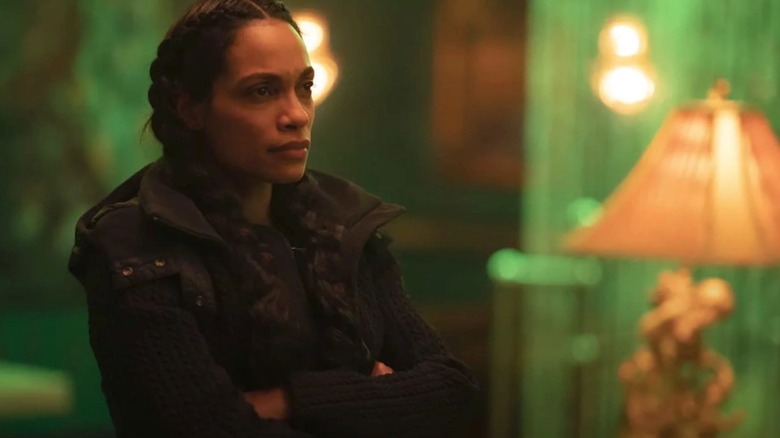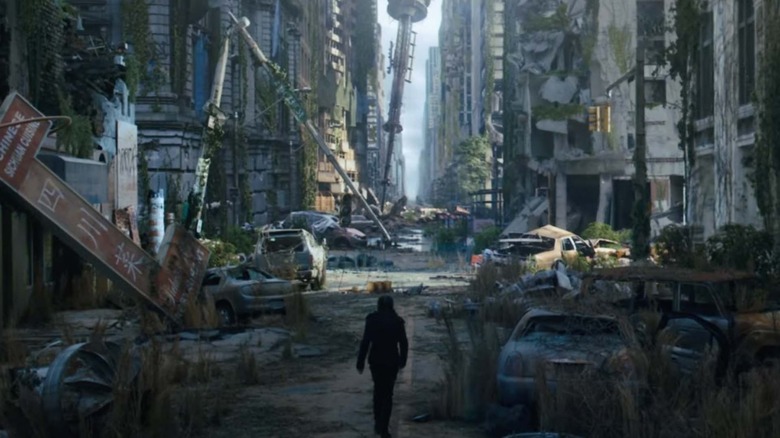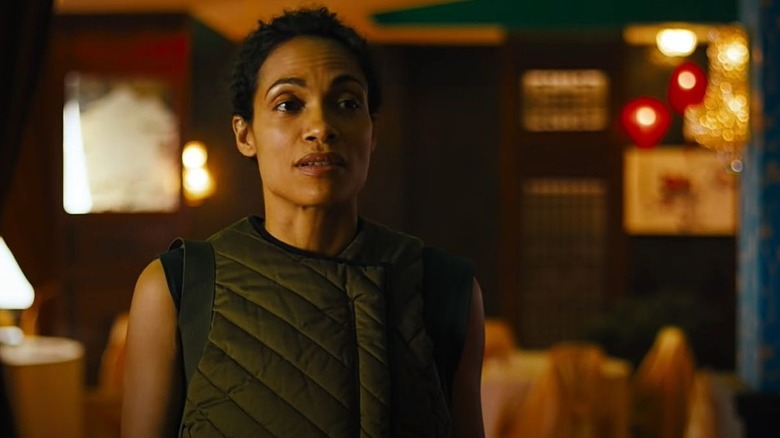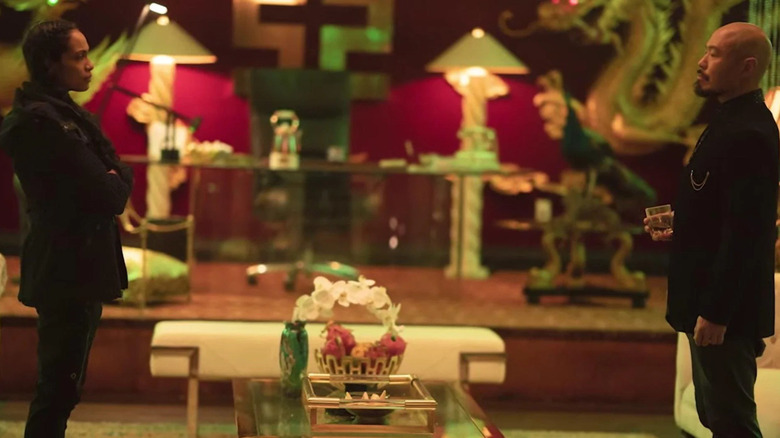DMZ Showrunner Roberto Patino Has Built A New Kind Of Dystopia [Interview]
When the comic series "DMZ" arrived nearly 20 years ago, it felt like a work of science fiction. But in 2022, its basic premise — a second American civil war has divided the nation, with warring armies stalling out on either side of Manhattan — feels unsettling. Like something that could actually happen. A subject that needed reinvention and retooling for a scarier, more turbulent time.
Showrunner Roberto Patino (whose credits include "Westworld" and "Sons of Anarchy") knew this. Gone is the basic thrust of the comic series, with its focus on action and the ongoing war. In its place is a new story set in the world of the comic: the demilitarized zone (the DMZ of the title) that used to be Manhattan, and is now home to 300,000 people who have spent nearly a decade caught between warring armies, and have created a new society from the wreckage. Yes, the city was devastated by war. But people live in homes. Businesses operate. Leaders of various factions debate each other to become the first elected governor of what the former U.S. citizens trapped on the island believe should be a new nation. "DMZ" is not a show about a wartorn world — it's a show about people who have created a brand new world out of the wreckage of the old one, and what those people choose to do with a second chance.
With an all-star cast (Rosario Dawson and Benjamin Bratt), incredible directors (Ava DuVernay took on the pilot, while Ernest R. Dickerson helms the rest), and the glossy production values you'd expect from an HBO Max series, "DMZ" has the potential to be something that generates a lot of conversation. Yes, for the hot topic buttons it presses, but also for its colorful depiction of a newborn community struggling to rise from the ashes of a cataclysm. And that's something we can all relate to in 2022.
Ahead of the show's HBO Max premiere, I spoke with Patino over the phone about the series, why it diverges from the source material, creating a dystopian world where people are just trying to live happy lives, and whether or not the four-episode limited series could inspire a second season.
'My idea was to just assume our worst case scenario'
I read the original Vertigo comic back in the day, and this is less of an adaptation of the comic, and more of a new story set in that world.
Like you, I read the comic when it came out at the end of 2005. I was obsessed with it because it presented a pretty crazy and terrifying circumstance, war in our own backyard. And that was an out-there idea. But it also kind of gave us this sort of "I can't stop looking" feeling, and you wanted to read more, because you wanted to explore this world. And that's why the comic works as it is, with the protagonist of the comic being a photo journalist who's left in the DMZ. He's basically a proxy for the audience. He's passive, and he's sort of taking in this world, and you're taking it in along with him.
Moreover, 2005 was eons away from where we are now. It was a post 9/11 world, our military was deployed in the Middle East, and that was basically the premise of the [new] civil war. It was, if our military's over there, what happens at home when there's an uprising here? Something that is so grounded in its time and place, by virtue of that fact, necessitates reinvention if you're making it for a different time and place, right? So it's been 17 years, almost 17 years since it came out, and we live in a totally different world, and in a world where the concept of civil war has taken on a whole new meaning. The ideas of the show have struck a personal chord, and The Other is not overseas, it's right in our backyards. It's our own internal division.
So that was one thing, and the other thing was, the comic, because I think it was such a crazy idea, that back then could never happen. It was so far away, and so it's a out there idea. Also, the comic really revels in the dystopia. It really revels in the war, the terrorism. And the fear of it, that's part of the fun, I guess, but it just felt irresponsible to do that, given where we've come as a country, and how divided we've become. So I really wanted to take a whole new direction where I... Look, you ask 10 people how we might get to civil war, you're going to get 10 different answers. I don't care about any of them, in truth. And I don't really care to ideate any sort of divisive notions of what the United States is.
So my idea was to just assume our worst case scenario. Start in it eight years later, and tell the story of what happens next, and that inherently is the story of rebuilding. That is the story of a disparate people coming together, the story of an abandoned people reclaiming their sense of identity, reclaiming their own homes. And ultimately, it's a sort of hope. So there's one more guiding thought that's sort of tethered to everything I've just said, which is that the comic is inherently masculine. It is all about men and testosterone, and getting by, and there are women in it surely, but they are not very developed, if at all. And frankly, for me, one of the only ... the most interesting character in the comic was Zee, who is this fearless Latina medic.
And that also felt right for reinvention because she's two-dimensional, at best. And I think part of the writer's job in adapting is to expand on the property, show it in a new light. And the idea of injecting this super-masculine IP with the fundamentally feminine and maternal energy and pursuit felt correct. It felt like the right way to interrogate these pillars of power that we celebrate, like Wilson's gold or Parco's Guns [two characters in the show, and their sources of power in the DMZ]. Here, we have a woman who's offering accountability. How's that for power, man? And that just felt novel, it felt like it was pushing the conversation in the right direction, and it felt generative, more than anything. And my thesis, above all, was to take DMZ and try to spin it into a story about unity and hope.
To paraphrase Francois Truffaut quote, it's hard to make an anti-war story because war seems inherently exciting on camera. But the series frames its action as horror. Bullets come out of nowhere. Violence is sudden.
There's the sort of moralistic responsibility there, the idea of our own civil war in our country shouldn't feel exciting, for one. I was very careful to ... it's a super-complicated world this is set in, right? There's so many levels, there's so many ... there's these two outside countries that are vying for this plot of land that's the de-militarized zone in Manhattan. And it's so complicated, right? But I just really wanted to narrow the narrative aperture down to a super simplistic story about a woman seeking to look for her son.
And in that capacity, and in the effort of really celebrating the people of the DMZ who have created their own economy, who have created a sort of patchwork system of gangs that is not ideal, but it works, they've made their way. I really wanted to keep that outside war outside. It was always just a pressure encroaching in on our world. That's why you never see a soldier, you see these ghosts, that if you get too close to the water, snipe at you, right? And it's more of a head space, but within that sort of bubble, really just kind of narrowing, putting up our blinders, and focusing on the DMZ.
'Enough time in that space gives rise to kind of a liberation'
It's kind of a bold choice that you never once have a voice over narration explaining, "eight years ago, this happened." Because at this point, eight years in, the people who are in the DMZ, they don't give a s***, they just want to survive.
That's exactly right. That's exactly right. And also, they don't have access to reliable information. You imagine that they're spotters, there's hearsay, but it's all he said, she said, and at the end of the day, who f****** matters, because I need to eat, and I need to take care of my family.
I was dreading the exposition dump that I thought would come in the first episode, and then it never did.
I went down that rabbit hole, and it always felt like, who cares? You can talk about how the free states grows up in Helena, Montana, and they gained traction, and they moved east, and this and that and that, and the United States only intervened too late, and so the fighting hit Manhattan. Well, who cares? Who cares? Just show it, was the ultimate answer. And I stand by it. It's been interrogated and tested, for sure.
The DMZ itself reminded me of the video game series "Fallout" or George Miller's "Mad Max: Fury Road," where you can see color and culture and art returning to a devastated area following something truly catastrophic. Society is rebuilding itself in a new form.
Well, you think about the Bronx in the '80s, which was the explosion of graffiti. I mean, not to get up my own ass here, but you think about La Belle Époque, where you had like, Faulkner writing beside Ernest Hemingway, writing beside F. Scott Fitzgerald, and these are booms that were adjacent to war. I like to think of the DMZ as its own boom of art and music, because it's the first time that art is being created for art's sake. There's no commercial value or aspiration attached to it. It is pure self-expression. And that's something we really delve into in [with the Christian] character, as a means of showing his stunted growth, but also as a sort of, almost a recorder of history and art of this time.
So I'm glad you keyed into that, but beyond all that, another stylistic approach was just erring away from the blue and gray and steel of dystopia, and kind of super-saturating this world. It's super-colorful, and the music is very lively, and in general the people are happy. There is suffering, for sure, and life is a grind every day. You wake up every day knowing that you can die in a million different ways, which is something that the little boy, Jordan Preston Carter's character, Odi, says. But there is a sort of peace and a resolve in that, and that is something that really ... that especially Odi's character, is something that I experienced firsthand in Colombia.
My family is from Colombia, like I said, and we would go there once or twice a year growing up. And I remember playing with my best friends, my cousins, and knowing that the FARC was just beyond that mountaintop, on the peripheries of the basin of Bogota, knowing that people are getting kidnapped and held for ransom, you just kind of ... it all becomes noise, and this sort of fight or flight mentality. Enough time in that space gives rise to kind of a liberation. So that's where Odi's character comes in, that's a lot of the ethos of the people of the DMZ. And we really wanted to celebrate the humanity that ultimately transpires from all that.
My favorite character in the series is Hoon Lee's Wilson, a drug-dealing hospital worker who reinvents himself to be this leader, crime lord, politician character in the DMZ. There's a little bit of "The Warriors" in this, but it makes sense that people would want to transform into these outsized, dramatic characters in this dangerous new world.
That's also, I think, a fundamentally human pursuit. And there's the pure reclamation of self- identity, and then there's the abusive reclamation ... or the abusive reinvention of self-identity. And I think a place like the DMZ affords everyone the ability to kind of strip away any sort of societal pressures of, or systematic distinctions of what is right and wrong, and what you should do, what you shouldn't do. And you can truly express yourself freely for the first time ever, truly free. And that's a wonderful thing, but at the same time, I think there are people who see that as an opportunity to start speaking with the loudest voice, banging their chest the hardest, and be getting a cultist personality.
And especially with Wilson's character, a switch flipped in him, and he sought power. He seized it, and he realized something that is another fundamental human trait, but he preyed on it, which is, that people like spectacle. People don't want to see a leader for how relatable and how wise they are, they want to see a guy stand up and spread his arms wide, and say, I got you. Here, you want food? I've got food. You need toilet paper? I've got toilet paper. I love you, right? It's that sort of tendency to authoritarianism in the best of versions, and I think ... which, to be clear, is a fundamentally horrible thing.
But it is that pursuit, [Benjamin Bratt's] Parco does the same thing. And I think there's a separate layer to that, which is, we're talking about immigrants, we're talking about people of color, who are now seizing an opportunity, right? In Wilson's case, he came from China as a young boy, with his guardian, Susie, in the show. And Parco's father came to the United States with his father, and he served the country in the military. But both of these men always saw a glass ceiling in terms of how they were perceived. And suddenly, this war happens, and this DMZ is created, and there are suddenly no qualifiers to anything. And, as opposed to Rosario Dawson's character, Alma, they chose to crash through that glass ceiling by themselves, and elevate themselves, because they've never had that ability to do so. The other version, which is what Alma does, is seeing the community, and seeing the communal power of rising up together. But I think both of those are fundamentally human, the abuse and the embrace of that ability to reclaim one's, quote unquote, "sense of self."
'The DMZ is always ripe for incredible stories'
I want to talk about your relationships with the directors. Of course, Ava DuVernay did the first episode, but I feel like, just because maybe I'm a film nerd, not enough people are talking about Ernest R. Dickerson directing the rest.
He's the man. He's a legend.
Can you talk about working with them? And how you, as a showrunner, clicked with their visions?
Yeah, so Ava really brought the stylistic approach to the world, that's sort of... We're in an inherently scopey world, and we don't shy away from those big, wide, beautiful shots. But for the most part, we're telling a very personal story, and the background, although it's there. We shot in 360 degrees, we're not shying away from everything. For the most part, though, the background is thrown away, because we're staying with Rosario Dawson, we're staying with Benjamin Brett, we're living in their eyes and their face. So she brought that sort of aesthetic, that cinema verite aesthetic, which I thought was correct for this world. And she also brought that sense of color, and that sense of life that you see throughout.
And then, in terms of episodes two through four that Ernest directed... Listen, man, Ernest Dickerson is the reason I first realized what a cinematographer is. I remember watching "Do the Right Thing" when I was nine years old, way too young to be watching it. And it was the first time I was like, oh my god, somebody's behind a camera shooting this. Because the visual language of that movie is so loud. And then he went on to do "Malcolm X," and all sorts of amazing Spike Lee movies.
But I remember at the end of "Do the Right Thing," I was like, what is that called? And I saw cinematographer, Ernest Dickerson. And those words singed themselves in my brain. And then he helmed some of the best episodes of "The Wire," which is my favorite show. And look, to fast forward 25 years, and being on a phone call, on a Zoom with him, asking him if he would consider directing the show is A, terrifying, but B, so amazing. And that guy is so cool, he's so calm, but he's so sharp with what he sees and how he wants to capture things. So he was a wonderful partner and collaborator.
Do you have more stories to tell? Could there be a season 2, either for new characters or surviving characters?
Yeah, absolutely. Absolutely. DMZ is a huge world, and it's a world that's predicated on rebuilding. And ultimately, not to get too, I guess, lofty, but it is fundamentally predicated on ideations of what we want America to look like, right? It's our tabula rasa, our clean slate. And there's so many characters, so many amazing characters that I couldn't fit in, that I have plenty and plenty of documents about, with backstories. And the DMZ is always ripe for incredible stories, and I think the limited series is the correct format for it, because it is a place, it is a mindset. And should I get the opportunity to continue telling stories about the DMZ, about the people of the DMZ, you bet that's going to happen, for sure.
All four episodes of "DMZ" are now streaming on HBO Max.



